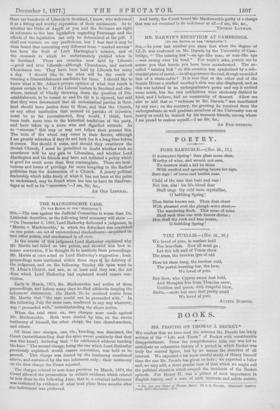THE MACKONOCHIE CASE.
[TO TEE EDITOR OF THE 4' SPEOTATOR."]
tSin,—The case against the Judicial Committee is worse than Dr. Littledale describes, as the following brief summary will show
" On December 4, 1869, Lord Hatherley delivered a judgment, in Martin v. Mackonochie,' in which the defendant was convicted on one point—an act of unintentional disobedience—acquitted on two other points, and condemned in all costs.
In the course of this judgment Lord Hatherley explained why Mr. Martin had failed on two points, and showed him how to insure conviction, if he thought fit to institute fresh proceedings. Mr. Martin at once acted on Lord Hatherley's suggestion ; fresh proceedings were instituted within three days of '5he delivery of the judgment, and on the following Sunday the spies went to St. Alban's Church, and saw, or at least said they saw, the act done which Lord Hatherley had explained would ensure con- viction.
Early in March, 1870, Mr. Mackonochie had notice of these -proceedings, and before many days he filed affidavits denying the informers' statements, On March 26, he received notice from Mr. Martin that "the case would not be proceeded with." In the following July the same case, unaltered in any way whatever, was "proceeded with," notwithstanding the above notice.
When the trial came on, two charges were made against Mr. Mackonochie. Both were denied by him, on the sworn testimony of himself, the other clergy, the two churchwardens, and others.
Of these two charges, one, viz., kneeling, was dismissed, the Court (notwithstanding that the spies swore positively that they saw him kneel) declaring that "he celebrated without bending the knee." The second charge, being the one which Lord Hatherley previously explained would ensure conviction, was held to be proved. This charge was denied by the testimony mentioned above, and sustained by the two informers only ; their testimony on the first charge the Court rejected.
The charges related to acts done previous to March, 1870, the Court allowed the prosecution to submit evidence which related to acts done in the following June, that is, a criminal indictment was sustained by evidence of what took place three months after the indictment was 'preferred. And lastly, the Court found Mr. Mackonochie guilty of a charge
that was not contained in the indictment at am, Sir, &c.,
THOMAS LAYMAN.






































 Previous page
Previous page